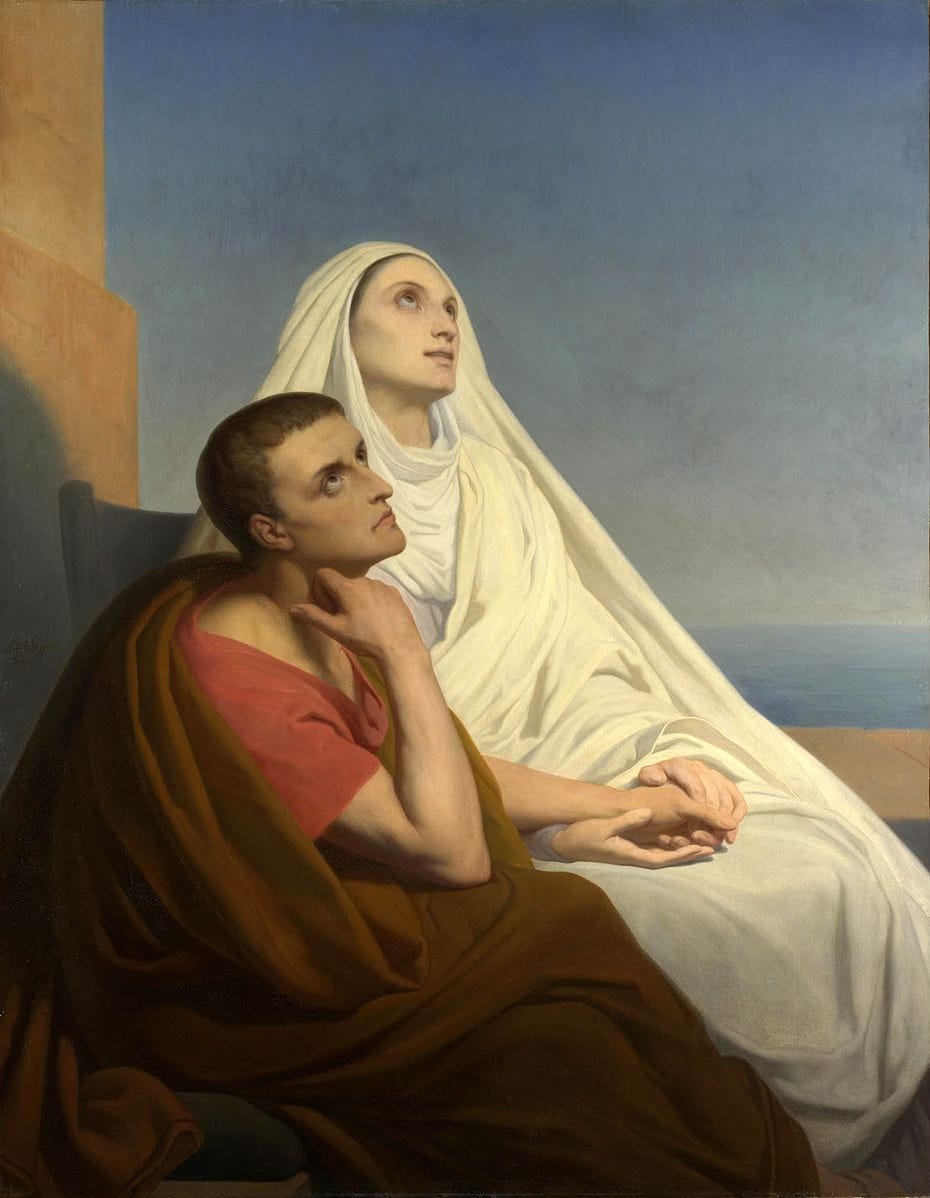Hello and welcome back to the weekly digest! This week some thoughts on Augustine’s Confessions, LCD Soundsystem’s American Dream, Aeschylus with input from Seth Benardete, and perhaps some intrigue in the footnotes for those who like that sort of thing.
I dreamed I saw Saint Augustine: Reading the Confessions in 2025
Aurelius Augustinus of Hippo is a fascinating figure. In one sense more orthodox than orthodox, on the other hand an ex-gnostic, a former Manichee conversant in the neoplatonism of his day and deeply influenced by it. Along with Plato and Aristotle there's a sense in which the mind of the christian west is simply Augustine’s. His youthful sexual escapades and his subsequent repudiation of them are inscribed writ large on the western mind. His theology of original sin and his dim view of a ruined humanity is one of the principal nonscriptural architects of the latent dualism I've often commented on in western christianity. There are great books that you simply have to read to understand the world we live in, and Augustine's Confessions, the inaugural autobiography (at least in a recognizable sense within the western tradition) is one such book. This week I finally read it after a long period of being reproached from my shelf by this particular copy.
I find Augustine surprisingly relatable, and not just because he also had a fairly serious Gnostic phase in his twenties.1 He was an educated and literate reader in what was on the whole a period of cultural and physical deterioration for his civilization, drawn to Christianity, and crippled by guilt about what he’d put his mother through-as the youths (and me) say: he’s just like me fr fr. I particularly sympathize as far as his linguistic limitations-I suppose in theory I read about as much or more German as he did Greek, but the unfavorable point of comparison with earlier and more polyglot generations of intellectuals is particularly stark, and in his case consequential-correct me if I’m wrong on this dear readers, but my understanding is that some of Augustine’s theology was influenced by deficient old Latin translations of the Pauline corpus, particularly Romans 5:12. I recognize in my own past history the somewhat lukewarm condition of half-faith in which Augustine finds himself in the middle parts of the book, but am finally making my own moves forward.
In my own case, as I deliberated about serving my Lord God (Jer. 30: 9) which I had long been disposed to do, the self which willed to serve was identical with the self which was unwilling. It was I. I was neither wholly willing nor wholly unwilling. So I was in conflict with myself and was dissociated from myself. The dissociation came about against my will. Yet this was not a manifestation of the nature of an alien mind but the punishment suffered in my own mind. And so it was 'not I' that brought this about 'but sin which dwelt in me' (Rom. 7: 17, 20), sin resulting from the punishment of a more freely chosen sin, because I was a son of Adam.
The later books of the Confessions are also interesting from a theological and philosophical perspective. Aristotle later came through the transmission of the Falsafa to be such a dominant influence on the theology of the Latin west that it’s interesting to see a Latin theology so obviously centered on platonism, esp Plotinus and Porphyry.2 If I ever get through the City of God I’ll let you know about that too!
Except for you, and you know who you are, this is not a love song: Audiovisual Friday
I gave a listen to LCD Soundsystem's 2017 comeback album American Dream while I watched the snow outside on Thursday. This was one of a handful of comeback albums by 90s and oughts legacy artists in their second of third decade which were recieved at the time as if they were thesecond coming, but haven't weathered the shift to poptimism particularly well, and I haven't heard much of in years. Hell Pitchfork themselves more or less retracted their words of paise for Daft Punk's A Random Access Memories a couple years back. This as I've suggested I think has as much to do with patterns is media journalism than with the quality of the music itself.3 All of those albums are at least fine, and RAM and Like Clockwork are both among my favorites by their respective artists. American Dream is perhaps a little less indebted to Kraftwerk than Murphy’s earlier work: the songs on the whole take less time to find their final form than on an album like The Sound of Silver or This is Happening, but it’s a difference of degree rather than kind.
More muddling through the Greeks with twentieth century philosophical assistance
Following my revisiting The Odyssey I’ve been reading not only Aeschylus’s Oresteia and Sophocles’ Oedipus trilogy, but the Iliad and a handful of Platonic dialogues I’d read before. I also perused the essays on the Eumenides and Oedipus The King in Seth Benardete’s The Argument of the Action. The Oresteia seemed to me surreal and nightmare-like, and this even in the more genteel translation of Richard Lattimore which I read (in this case because it was the one I found in a volume of the midcentury University of Chicago collected Greek tragedies at my favorite used bookstore) for the invisible unit.4 For more of a taste of what I mean, here’s Robert Fagles’ rendering of one of the more memorable passages in Agamemnon:
for that we must thank the gods with a sacrifice our sons will long remember. For their mad outrage of a queen we raped their city - we were right.5
The beast of Argos, foals of the wild mare, thousands massed in armour rose on the night the Pleiades went down, and crashing through their walls our bloody lion lapped its fill, gorging on the blood of kings.
Between this and the furies which only Orestes can see, or the apparition of Clytemnestra hounding the sleeping furies, the whole cycle is possessed of an eerie power which I didn't necessarily expect headed into the text. Seth Benardete’s essay on the Eumenides is at once fascinating and powerfully enlightening and like much of his writing, deeply perplexing. He reads a powerful circularity into Aeschylus’s cycle, the drama of which legitimates itself and retroactively justifies the Trojan war, interpreting Athena’s closing declaration to the Athenians and the gendered rhetoric throughout the play as possessing particular significance.
Apollo’s inconsequence conceals a threat: Zeus has shown through Athena that mothers are superfluous. If he wants to, Zeus can cancel the role of the Furies altogether by eliminating women. Terror would remain but not love. Athena understands Apollo perfectly: she offers to make the Furies the protectors of marriage (832-36). Athena herself, however, does not use her sexless birth in this way; instead, she cites it as the reason for her vote. She votes her nature (736), and she alone does so. Those who voted with her denied their nature and obeyed hers; those who voted against her followed no less unnaturally the fatherless Furies. Right, as men understand it, is blind to nature. Men believe in absolute right. They believe the gods support them in this belief. Athena denies it, asserting instead that the nature of each human being is double in origin and single in sex.
They are theretore too complex to vote their nature. The known requirements of the city must take the place of their own unknowable nature. The male must take precedence. Clytemestra, who comes closest to being male and female at once (Agamemnon II, 351), proves it. She punished Agamemnon for the sacrifice of her daughter, but she never connected that crime with the injustice of the Trojan war. She thus granted implicitly the possibility of its justice, for the perfect vengeance would have been to sacrifice Orestes for the sake of Aegisthus's security (Agamemnon 878-85). She could not, however, have sacrificed Orestes without denying her reason for punishing Agamemnon. She knows that the kind of justice to which Agamemnon appealed could not even speciously justify such a sacrifice in Aegisthus's case. Iphigeneia's sacrifice is merely the sign of the city's right to send its young men to death. Mothers must not be given the right to question that. "Let there be foreign war," Athena exclaims; "it is close at hand without trouble, in which there will be a kind of uncanny love (eros) of glory (864-65)." Athena heard Orestes® summons at Troy, where she was taking possession of land that the Achaean commanders had assigned her (397-402). The Trojan War can now take place.
I feel incapable of providing much in the way of commentary on that, and so I’ll close on a note of suitable aporia. I hope to reestablish a regular weekly schedule, we’ll see if it happens. Goodnight everybody!
He was a Manichee significantly longer than I was a kind of Valentinian and in a real community to boot, but much of the rhetoric described and the final exit through platonism felt very familiar. I mentioned only in passing in that post that the part of my own story I’m most mortified and embarrassed by today is not that I sojourned for a time in error, but rather that it was reading the Pseudo-Dionysius on The Celestial Hierarchy that to a large extent influenced my choice of denomination when I started to gravitate to orthodoxy again. Nothing wrong with the pseudo-Dionysius, and I haven’t gravitated toward the more usual denominations this occurs in but let’s just say that the adult convert drawn in by ancient theology is well, a type, and not one that I would usually want to be associated with, although this too is a sinful feeling of pride. (Part of this footnote was inspired by an exchange with
, thanks Barbara!)This is not to say that the influence of Plotinus and Porphyry was entirely distinct from that on Aristotle: Porphry’s Isagoge, a commentary on Aristotle’s Categories was a hugely influential text down through the Middle Ages.
I was particularly taken by Naomi Kanakia's recent piece, provocatively titled "Is Literature a False God?" My gut impulse as a Christian and as a Platonist is to say that it is, but then I am also a post-romantic, modern subject, and I certainly wouldn't want to live without poetry or beautiful pictures to admire. To a point I sympathize with the aesthetes. The total hermeneutic of paranoia & desperate scrying of every artifact of culture for traces of secret fascism was a big part of how aesthetically miserable the first Trump era often was.
On the other hand a part of me does think it’s all just a kind of idolatry or subdemiurgy, a sinful exertion of the self which should rather be directed toward the Lord. Like Borges I am fascinated by that passage in the Hadith threatening artists with the impossible challenge of breathing life into their creations on the Last Day, and yet with Goethe I believe in a God who rewards those who strive.
Moreover I suspect that this will be a telling time for those who think and opine about the affairs of state and art and heaven. It will be enormously interesting I to see what Dan Oppenheimer has called the “Rubio Test” applied to heterodoxy at large. One the last decade, and particularly the last five years, it has been one thing to position oneself as a brave truth teller. Now the winds have shifted yet again, and we will perhaps discover who amongst the heterodox was truly opposed to illiberalism and who was merely waiting for their turn to take the reins. It has been my practice to rarely offer a positive position on this blog, and rarely to make my political critiques the primary focus, and I have no intention of changing that. I am always tediously dragging the higher things down to earth, and I will continue to do so, but I don't see it as a productive goal at the moment, and in any case my writing habits preclude regular work like that. Still, I will be watching the scene with great interest over the next few years.
*At least in literary and to a lesser extent cinematic terms. There is an argument to be made, one that I probably would make, for the music of the 2010s as triumphant in its own right, particularly in the worlds of r&b and hip hop. The songwriterly pop girls after 2012 and the leftover 2000s indie rock that flavored the first three years of the decade was a lot of fun too!
How we are supposed to receive sentiment such as this is one of my great and perhaps unanswerable questions about Greek tragedy. Certainly in some of Euripides, things like The Trojan Women one thinks one detects that first flowering of what will become in the hands of a rather different culture the social conscience of what I have no doubt rather irresponsibly been referring to as “the west.” I need to reread The Birth of Tragedy, and I remember his critique being rather more formal, but one suspects that this is one of the problems Nietzsche had with Euripides. Do we find it in Aeschylus? That I’m less sure of.







Enjoyed reading this—I hadn’t encountered Bernadetes before but now I’m going to dig that essay up and see what I can make of it, thank you!
Funny thing: I always despised Clytemnestra, just a knee-jerk reaction to reading the Orestia early on as a high-schooler. Then I was re-reading and teaching the play to a book club online in 2021. I began to have intense, vivid, horrifying dreams that I was Clytemnestra and that snakes were sucking blood from my left breast. I’d wake up gasping in terror, relieved it was “only a nightmare.” But strangely, the pain in my breast, where the snakes had been, lingered long into each day after I awoke. Finally, I decided to get a mammogram “just in case.” They found the first tumor there and the rest … well, lol. And thus my newsletter was born. Bernadette’s sentence—“mothers must not be given the right to question that”—wow, I feel I could easily turn that into a central question of what I’ve been trying to write through all these years!!!
Also my favorite Augustine factoid is that Rudolph Steiner believed he was Augustine reincarnated!
I very much agree with your observation that the tracks from “American dream” take a while to reach their climaxes. I kinda like that about them, myself. Kinda reminds me of certain Björk songs. They kinda assemble and then disassemble right before your very ears! Like they just fell outta the ether and then have to return back home after a while🥹